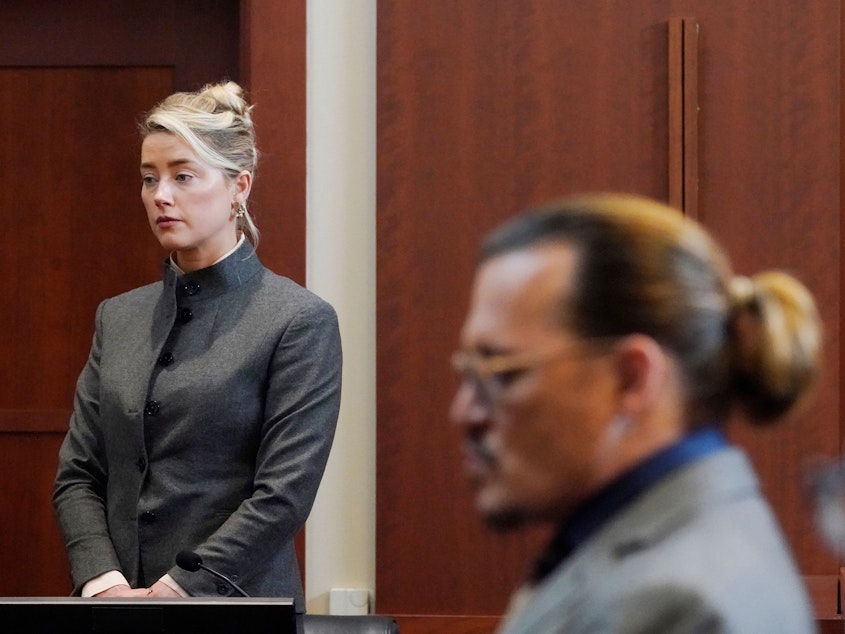Depp-Heard jury has reached a verdict in multimillion-dollar libel case

The jury in the libel case between actors Johnny Depp and Amber Heard has reached a verdict and will soon announce its decision, according to court officials. The verdict is expected to be read in court at 3 p.m. ET.
Depp sued Heard, his ex-wife, for $50 million, saying she defamed him by accusing him of domestic abuse.
With both actors accusing the other of ruining their lives, the outcome came to be seen as a referendum on who the jury found more credible and believable: Depp or Heard.
Heard, 36, also filed a countersuit against Depp, 58, seeking $100 million in damages and saying his legal team falsely accused her of fabricating claims against Depp.
Jurors began deliberating on Friday before taking a break over the holiday weekend. They returned to the courthouse on Tuesday. It wasn't immediately clear whether Depp or Heard — both of whom testified and were central presences during the six-week trial — would be present when the verdict is announced.
Sponsored
The jury clarified which statement prompted Depp's lawsuit
Shortly after Tuesday's lunch break, the jury sent Judge Penney Azcarate a question seeking a clarification: Does Depp's contention that Heard made a defamatory statement apply to Heard's newspaper article in its entirety or only to its headline?
"The statement is the headline, not the entire op-ed," Azcarate wrote in reply after conferring with both sides' attorneys.
The headline in question is from Heard's 2018 op-ed in The Washington Post: "I spoke up against sexual violence — and faced our culture's wrath. That has to change."
When the judge sent the jurors to deliberate, they were given a verdict form that lists a series of questions, including whether Depp's team has proven that Heard's statement is false. The form also asks if the jurors agree that Heard intended to defame Depp — another key element of defamation.
Sponsored
The couple's relationship took on elements of a public spectacle
The trial in Fairfax County, Va., has publicly aired details from the couple's disintegrating marriage, from Depp's episodes of drug use to accusations and counter-accusations of physical abuse.
"I struggle to find the words to describe how painful this is," Heard said when her attorney asked how she felt about the case. "This is horrible for me to sit here for weeks and relive everything."
Depp has said Heard's claims ruined his career and spiked his work in Disney's lucrative Pirates of the Caribbean film franchise. Asked during the trial what he had lost because of the allegations, Depp replied, "nothing less than everything."
Jurors were confronted with a trove of evidence in the trial, including video and audio recordings of arguments and the actors' turbulent life together, along with text messages and emails.
Sponsored
The case was sparked by a 2018 op-ed
Depp sued Heard over a 2018 op-ed published by The Washington Post in which Heard called for change in how the U.S. treats abuse survivors and urged support for the Violence Against Women Act.
The essay didn't directly refer to Depp by name. But his 2019 court complaint states, "the op-ed plainly was about ... Ms. Heard's purported victimization after she publicly accused her former husband, Johnny Depp, of domestic abuse in 2016, when she appeared in court with an apparently battered face and obtained a temporary restraining order against Mr. Depp."
Heard and Depp married in February 2015, and Heard filed for divorce in May 2016. Less than a week later, she took out a restraining order against Depp, saying he threw an iPhone at her head, striking her, during an argument in Los Angeles. Depp denied that, saying Heard was seeking leverage in their divorce. At the time, police said they found no evidence of a crime and that Heard did not insist on a formal report.
When the two settled their divorce in 2017, the agreement reportedly included a stipulation in which they agreed not to discuss their relationship in public.
Sponsored
Depp sued Heard for three counts of defamation, seeking at least $50 million in compensatory damages and a punitive award of at least $350,000, along with attorney fees and court costs. [Copyright 2022 NPR]



